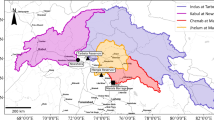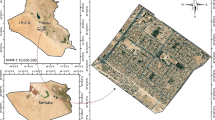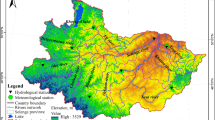Abstract
The purpose of this study is to evaluate the impact of climate change (CC) on the management of the three reservoirs in the Lièvre River watershed and to investigate adaptation strategies to CC. To accomplish this objective, a reservoir management tool was developed. The tool integrates: hydrological ensemble streamflow predictions; a stochastic optimization model; a neural network model; and a water balance model. Five climate projections from a regional climate model, under current (1961–2000) and future (2041–2070) climate scenarios, were used. Adjustments to the reservoirs operating rules were used as an adaptation strategy to limit flooding in the watershed and also in the Montreal Archipelago located downstream of the watershed. A number of constraints in the reservoirs of the Lièvre watershed are related to summer recreational activities, which would start earlier in future climate. Modifications of these constraints were simulated to take into account socio-economic impacts of climate change on reservoirs operation. Results show that greater quantities of water would have to be stored in the Lièvre River watershed in the future, to decrease the risk of flooding in the Montreal Archipelago. The reservoir located at the downstream end of the watershed would be more vulnerable and its reliability may decrease in the future. Adaptation measures reduced the inter-annual variability of the reservoir level under future climate conditions. The reservoir management tool is an example of a no-regrets strategy, as it will contribute to improve the tools currently available to manage the reservoirs of the Lièvre River watershed.







Similar content being viewed by others
References
Caya D, Laprise R (1999) A semi-implicit semi-Lagrangian regional climate model: the Canadian RCM. Mon Weather Rev 127(2–3):341–362
Chen J, Brissette FP, Poulin A, Leconte R (2011) Overall uncertainty study of the hydrological impacts of climate change for a Canadian watershed. Water Resour Res 47(12):1–16
Christensen NS, Wood AW, Voisin N, Lettenmaier DP, Palmer RN (2004) The effects of climate change on the hydrology and water resources of the Colorado River basin. Clim Chang 62:337–363
Day GN (1985) Extended streamflow forecasting using NWSRFS. J Water Resour Plan Manag ASCE 111(2):157–170
Eum H-I, Vasan A, Simonovic SP (2012) Integrated reservoir management system for flood risk assessment under climate change. Water Resour Manag 26(13):3785–3802
Fortin JP, Turcotte R, Massicotte S, Moussa R, Fitzback J, Villeneuve JP (2001) Distributed watershed model compatible with remote sensing and GIS data. I: description of model. J Hydrol Eng 6(2):91–99
Fortin LG, Turcotte R, Pugin S, Cyr J, Picard F (2007) Impact of climate changes on the management plans for Saint-Francois and Aylmer lakes in the south of Quebec. Can J Civ Eng 34(8):934–945
Georgakakos AP, Yao H, Kistenmacher M, Georgakakos KP, Graham NE, Cheng F, Shamir E, Spencer C, Spencer C, Shamir E (2012) Value of adaptive water resources management in Northern California under climatic variability and change: reservoir management. J Hydrol 412–413:34–46
Govindaraju RS (2000) Artificial neural networks in hydrology. I: preliminary concepts. J Hydrol Eng 5(2):115–123
Huaringa U, Leconte R (2012) Changements climatiques sur le système hydrique de la rivière des Outaouais: débits de la rivière des Prairies et de la rivière des Milles-Îles. Final report. Research projet funded by the Ouranos Consortium on Regional Climatology and Adaptation to Climate Change. Département de génie civil, Faculté de génie, Université de Sherbrooke, 36 p
IPCC (2007) In: Parry ML, Canziani JP, Palutikof JP, van der Linden PJ, Hanson CE (eds) Impacts, adaptation and vulnerability. Contribution of working group II to the fourth assessment report of the intergovernmental panel on climate change. Intergovernmental Panel on Climate Change, Cambridge, 1000 p
Leconte R, Trudel M, Krau S, Huaringa U, Côté P (2012) Analyse et adaptation au contexte de changements climatiques des outils d’aide à la gestion du système hydrique du bassin versant de la rivière des Outaouais: mise en oeuvre sur le sous basin de la rivière du Lièvre. Final report. Research projet funded by the Ouranos Consortium on Regional Climatology and Adaptation to Climate Change. Département de génie civil, Faculté de génie, Université de Sherbrooke, 83p
Li L, Xu H, Chen X, Simonovic SP (2010) Streamflow forecast and reservoir operation performance assessment under climate change. Water Resour Manag 24:83–104
McFarlane NA, Boer GJ, Blanchet JP, Lazare M (1992) The Canadian climate center second-generation general circulation model and its equilibrium climate. J Clim 5:1013–1044
Minville M, Brissette F, Krau S, Leconte R (2009) Adaptation to climate change in the management of a Canadian water-resources system exploited for hydropower. Water Resour Manag 23(14):2965–2986
Minville M, Brissette F, Leconte R (2010) Impacts and uncertainty of climate change on water resource management of the Peribonka River System (Canada). J Water Resour Plan Manag 136(3):376–385
Payne JT, Wood AW, Hamlet AF, Palmer RN, Lettenmaier DP (2004) Mitigating the effects of climate change on the water resources of the Columbia River Basin. Clim Chang 62(1–3):233–256
Raje D, Mujamdar PP (2010) Reservoir performance under uncertainty in hydrologic impacts of climate change. Adv Water Resour 33:312–326
Schmidli J, Frei C, Vidale PL (2006) Downscaling from GCM precipitation: a benchmark for dynamical and statistical downscaling methods. Int J Climatol 26(5):679–689
Simonovic SP, Li L (2003) Methodology for assessment of climate change impacts on large-scale flood protection system. J Water Resour Plan Manag 129(5):361–371
Veijalainen N, Dubrovin T, Marttunen M, Vehviläinen B (2010) Climate change impacts on water resources and lake regulation in the Vuoksi watershed in Finland. Water Resour Manag 24(13):3437–3459
Vicuna S, Dracup JA, Dale L (2011) Climate change impacts on two high-elevation hydropower systems in California. Clim Chang 109(Suppl 1):151–169
Vonk E, Xu YP, Booij MJ, Zhang X, M Augustijn DC (2014) Adapting multireservoir operation to shifting patterns of water supply and demand. Water Resour Manag 28(3):625–643
Wilby RL, Harris I (2006) A framework for assessing uncertainties in climate change impacts: low-flow scenarios for the River Thames, UK. Water Resour Res 42(2), W02419
Yeh WW (1985) Reservoir management and operations models: a state-of-the-art review. Water Resour Res 21(12):1797–1818
Acknowledgments
This research was supported by funds from the 2006–2012 Quebec’s Climate change Action Plan. The authors wish to thank the Ouranos Consortium on Regional Climatology and Adaptation to Climate Change and the Centre d’expertise hydrique du Québec for their contribution to the production of climate change projections.
Author information
Authors and Affiliations
Corresponding author
Rights and permissions
About this article
Cite this article
Huaringa Alvarez, U.F., Trudel, M. & Leconte, R. Impacts and Adaptation to Climate Change Using a Reservoir Management Tool to a Northern Watershed: Application to Lièvre River Watershed, Quebec, Canada. Water Resour Manage 28, 3667–3680 (2014). https://doi.org/10.1007/s11269-014-0694-z
Received:
Accepted:
Published:
Issue Date:
DOI: https://doi.org/10.1007/s11269-014-0694-z




